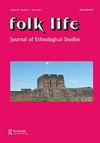‘Some feckin’ jump like’: Fordism and Ford workers in Ireland
IF 0.1
4区 社会学
0 FOLKLORE
引用次数: 1
Abstract
ABSTRACT This article examines the experiences of Irish workers employed in the Ford Marina Plant, Cork, Ireland between 1917 and 1932. The piece reconstructs how workers in Cork, unused to modern factory employment, adapted to Fordism. It begins with an overview of the ideology of Fordism and how it was implemented in Cork and then proceeds to examine the difficulties experienced by craft and agricultural workers in adapting to a modern factory environment as well as other features of Fordism, such as the strict discipline of the firm and the company’s severe attitude towards trade unions. Finally, the article analyses resistance among the workforce to management authority, placing these in their broader context. Throughout, the article makes extensive use of later oral testimony, the social memory of the workforce and reading against the grain of official documents to reconstruct the experiences of workers whose own testimony is no longer available.“有些人跳起来像”:爱尔兰的福特主义和福特工人
摘要本文考察了1917年至1932年间在爱尔兰科克福特码头工厂工作的爱尔兰工人的经历。这篇文章重建了科克的工人如何适应福特主义,他们不习惯现代工厂的工作。它首先概述了福特主义的意识形态及其在科克的实施方式,然后考察了工艺和农业工人在适应现代工厂环境方面所经历的困难,以及福特主义的其他特征,如公司的严格纪律和公司对工会的严厉态度。最后,文章分析了员工对管理权威的抵制,并将其置于更广泛的背景下。自始至终,这篇文章广泛利用了后来的口头证词、劳动力的社会记忆以及与官方文件相悖的阅读,来重建那些自己的证词不再可用的工人的经历。
本文章由计算机程序翻译,如有差异,请以英文原文为准。
求助全文
约1分钟内获得全文
求助全文
来源期刊
CiteScore
0.30
自引率
66.70%
发文量
17
期刊介绍:
Folk Life: Journal of Ethnological Studies is a journal devoted to the study of all aspects of traditional ways of life in Great Britain and Ireland. The journal publishes original, high quality, peer-reviewed research in the form of unsolicited articles, solicited papers (which are usually selected from those read at the Society"s annual conference) and of members" papers (which are usually short reports of work in progress). Work published in Folk Life may include, for example, papers dealing with the traditional ways of life of other countries and regions, which may be compared to or contrasted with those of Great Britain and Ireland.

 求助内容:
求助内容: 应助结果提醒方式:
应助结果提醒方式:


